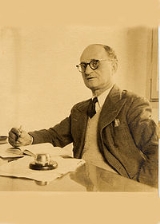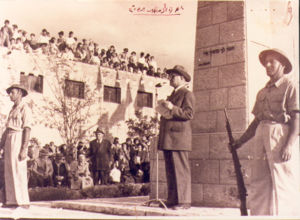
Baruch Ostrovsky
Encyclopedia
Baruch Ostrovsky the first mayor of Raanana, served as mayor for 28 years. He championed democracy, equality, education and organized Jewish labor.
, in the town of Rogachov, in 1890. In early childhood, receiving a traditional education, he already demonstrated a craving for higher education and Zionism
. In 1912 he immigrated to Palestine
alone, laboring with the pioneers of the Second Aliyah
and joining the HaShomer
organization. A year later, he departed for the U.S.
with the intention of marrying his fiancée, who had by then arrived there from Ukraine. The political situation—the outbreak of World War I
-- obstructed his plans to return at once with his family.

 While in the US, Ostrovsky earned his living teaching a wide variety of subjects, including Hebrew, history, Bible, as well as Yiddish. He became a renowned and respected educational figure, as director and inspector of schools as well as principal of the teacher's seminary of the Workmen's Circle Jewish educational system. Contemporaneously with his educational work, Ostrovsky was active in the Zionist Movement's labor organization, Poale Zion
While in the US, Ostrovsky earned his living teaching a wide variety of subjects, including Hebrew, history, Bible, as well as Yiddish. He became a renowned and respected educational figure, as director and inspector of schools as well as principal of the teacher's seminary of the Workmen's Circle Jewish educational system. Contemporaneously with his educational work, Ostrovsky was active in the Zionist Movement's labor organization, Poale Zion
, with the leaders David Ben-Gurion
, Ber Borochov
and Yitzhak Ben-Zvi
. He directed and published the Youth Organizations' journal.
Ostrovsky regarded Raanana as his life project and as mayor
, he dedicated himself fully and wholeheartedly to Raanana's construction and development. His public service was a non-paid voluntary post as he refused payment in excess of the salary of an agricultural day laborer, which he was earning. The equivalent of his municipal salary formed a lending fund at the disposal of the needy. Many of the early settlers of Raanana benefited from his support. He displayed sincere concern for the welfare and rights of the laborers. He joined forces to form a variety of beneficial enterprises: a unified labor office, a unified front protecting organized Jewish labor, a joint health fund (kupat holim) for all inhabitants of the town, and the establishment of a lending and savings bank; also, the organization of a permanent water supply system for the town.
Ostrovsky's activities as a supporter of organized Jewish labor are augmented by his campaign for laborers' voting rights—deprived from the new-comers by the older Jewish settlements taking advantage of the mandate's discriminatory set of laws. His modest mode of life, scorning all forms of luxury and excess, placed him on equal ground with the hard working and low earning inhabitants of his town. He nurtured good relations with the neighboring Arab villagers, particularly with those of Hirbet Azun. He set high standards for the city as a 'green' settlement, promoted equality and the welfare of citizens, and laid the foundation stones of many public and educational institutions.
In the mid 1930s, Ostrovsky had already laid the foundations and infrastructure for factories to be built in the settlement of Raanana.
In December 1949, he initiated the establishment of the industrial zone and directed his efforts to the building of the first industrial plants. This was part of an endeavor to create job opportunities for new immigrants and existing residents alike.
"We deal with industry exactly as we deal with agriculture" (quoted from the minutes of a local council meeting on 2.1.1951).
Baruch Ostrovsky was a lover of books and his 4000 volume library, encompassing a wide variety of subjects – on the history of the Zionist organization, on Eretz Yisrael, history, philosophy, education, literature and encyclopedias – were at the disposal of those eager to broaden their knowledge in the developing town.
Ostrovsky envisioned the plans for Raanana's first high school though he did not live to see it. Late in his life he wrote:
Biography
Baruch Ostrovsky was born in UkraineUkraine
Ukraine is a country in Eastern Europe. It has an area of 603,628 km², making it the second largest contiguous country on the European continent, after Russia...
, in the town of Rogachov, in 1890. In early childhood, receiving a traditional education, he already demonstrated a craving for higher education and Zionism
Zionism
Zionism is a Jewish political movement that, in its broadest sense, has supported the self-determination of the Jewish people in a sovereign Jewish national homeland. Since the establishment of the State of Israel, the Zionist movement continues primarily to advocate on behalf of the Jewish state...
. In 1912 he immigrated to Palestine
Palestine
Palestine is a conventional name, among others, used to describe the geographic region between the Mediterranean Sea and the Jordan River, and various adjoining lands....
alone, laboring with the pioneers of the Second Aliyah
Second Aliyah
The Second Aliyah was an important and highly influential aliyah that took place between 1904 and 1914, during which approximately 40,000 Jews immigrated into Ottoman Palestine, mostly from the Russian Empire, some from Yemen....
and joining the HaShomer
Hashomer
Hashomer was a Jewish defense organization in Palestine founded out of Bar-Giora in April 1909. It ceased to operate after the founding of the Haganah in 1920. The purpose of Hashomer was to provide guard services for Jewish settlements in the Yishuv, freeing Jewish communities from dependence...
organization. A year later, he departed for the U.S.
United States
The United States of America is a federal constitutional republic comprising fifty states and a federal district...
with the intention of marrying his fiancée, who had by then arrived there from Ukraine. The political situation—the outbreak of World War I
World War I
World War I , which was predominantly called the World War or the Great War from its occurrence until 1939, and the First World War or World War I thereafter, was a major war centred in Europe that began on 28 July 1914 and lasted until 11 November 1918...
-- obstructed his plans to return at once with his family.
In the USA
In 1913 he took part in the founding of Ahuza Alef - New York, an organization dedicated to the purchase of lands and the establishment of a Hebrew settlement, to be inhabited by Jews tilling their own soil.

Poale Zion
Poale Zion was a Movement of Marxist Zionist Jewish workers circles founded in various cities of the Russian Empire about the turn of the century after the Bund rejected Zionism in 1901.-Formation and early years:Poale Zion parties and organisations were started across the Jewish diaspora in the...
, with the leaders David Ben-Gurion
David Ben-Gurion
' was the first Prime Minister of Israel.Ben-Gurion's passion for Zionism, which began early in life, led him to become a major Zionist leader and Executive Head of the World Zionist Organization in 1946...
, Ber Borochov
Ber Borochov
Dov Ber Borochov was a Marxist Zionist and one of the founders of the Labor Zionist movement as well as a pioneer in the study of Yiddish as a language....
and Yitzhak Ben-Zvi
Yitzhak Ben-Zvi
Yitzhak Ben-Zvi was a historian, Labor Zionist leader, the second and longest-serving President of Israel.-Biography:...
. He directed and published the Youth Organizations' journal.
In Eretz Israel
In 1930 Ostrovsky finally succeeded in fulfilling his Zionist ambition by giving up his comfortable existence in the USA and settling in Raanana, a small town in the Sharon plain, with his wife and two children.
"As a Zionist, I abandoned my source of income, the respected position I acquired in America as the principal of a high school in NY, as the head of the Jewish Teachers' Union, as editor of a Jewish Journal and as author of Yiddish school books and immigrated to Eretz Yisrael. A Zionist is not only said ..." (Excerpt from Ostrovsky's Diary)
Ostrovsky regarded Raanana as his life project and as mayor
Mayor
In many countries, a Mayor is the highest ranking officer in the municipal government of a town or a large urban city....
, he dedicated himself fully and wholeheartedly to Raanana's construction and development. His public service was a non-paid voluntary post as he refused payment in excess of the salary of an agricultural day laborer, which he was earning. The equivalent of his municipal salary formed a lending fund at the disposal of the needy. Many of the early settlers of Raanana benefited from his support. He displayed sincere concern for the welfare and rights of the laborers. He joined forces to form a variety of beneficial enterprises: a unified labor office, a unified front protecting organized Jewish labor, a joint health fund (kupat holim) for all inhabitants of the town, and the establishment of a lending and savings bank; also, the organization of a permanent water supply system for the town.
Ostrovsky's activities as a supporter of organized Jewish labor are augmented by his campaign for laborers' voting rights—deprived from the new-comers by the older Jewish settlements taking advantage of the mandate's discriminatory set of laws. His modest mode of life, scorning all forms of luxury and excess, placed him on equal ground with the hard working and low earning inhabitants of his town. He nurtured good relations with the neighboring Arab villagers, particularly with those of Hirbet Azun. He set high standards for the city as a 'green' settlement, promoted equality and the welfare of citizens, and laid the foundation stones of many public and educational institutions.
In the mid 1930s, Ostrovsky had already laid the foundations and infrastructure for factories to be built in the settlement of Raanana.
In December 1949, he initiated the establishment of the industrial zone and directed his efforts to the building of the first industrial plants. This was part of an endeavor to create job opportunities for new immigrants and existing residents alike.
"We deal with industry exactly as we deal with agriculture" (quoted from the minutes of a local council meeting on 2.1.1951).
Baruch Ostrovsky was a lover of books and his 4000 volume library, encompassing a wide variety of subjects – on the history of the Zionist organization, on Eretz Yisrael, history, philosophy, education, literature and encyclopedias – were at the disposal of those eager to broaden their knowledge in the developing town.
Ostrovsky envisioned the plans for Raanana's first high school though he did not live to see it. Late in his life he wrote:
"We emigrated from America, not to be capitalists or land-owners, but rather to be Jews and live amongst Jews in an independent Jewish State, a democratic existence of equality, wherein everyone will be capable of earning his living – even if we are the sole followers of this socialistic system."

